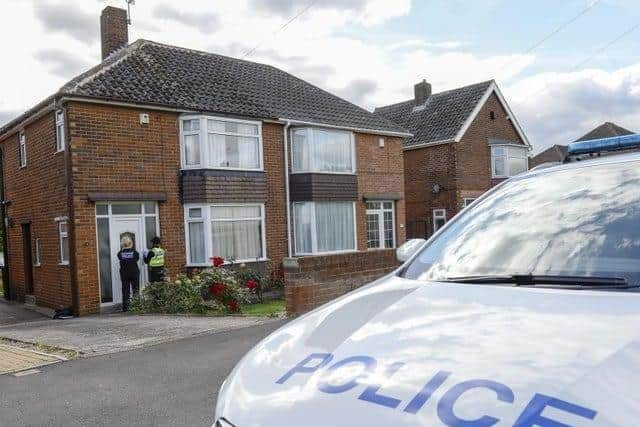Inquest opens into death of Sheffield woman Marjorie Grayson who killed husband in tragic circumstances
and live on Freeview channel 276
Marjorie Grayson, aged in her 80s, “tragically” stabbed her husband, Alan, in the home they shared in Orgreave Lane, Handsworth, in September 2018.
Mrs Grayson, a retired office administrator, appeared at Sheffield Crown Court in June 2019 over the fatal stabbing, which was said to have occurred during a “trivial disagreement”.


Sheffield Crown Court heard the pensioner was suffering from a form of dementia when she stabbed her husband in his chest and back.
The court heard the couple had been ‘happily married’ for nearly 60 years.
It was said during her court case that Mrs Grayson had a rare condition known as behavioural variant-frontotemporal dementia, which had affected her ability to inhibit her impulses on the day of the “inexplicable” attack upon her husband.
She was initially charged with murder but pleaded guilty to manslaughter on the grounds of diminished responsibility.
She was sentenced to a hospital order under the Mental Health Act.
Sentencing her, Mr Justice Matthew Nicklin described the case as “tragic”.
Mrs Grayson’s barrister, Julia Smart QC, told the court she had been an “exemplary” mother and grandmother.
She described Mrs Grayson as “kind, caring and extremely selfless”.
During an inquest into Mrs Grayson’s own death, which opened in Sheffield today, it was revealed that after initially being held in custody at HMP Newhall in Wakefield until she was sentenced, Mrs Grayson was then transferred to St Andrew’s Healthcare – a specialist psychiatric facility in Northampton.
She spent three months there before being transferred to a facility in Grenoside, Sheffield.
The exact circumstances of Mrs Grayson’s death at her home in September 2020 have not yet been discussed, but it was stated by Assistant Coroner Abigail Combes at this morning’s inquest that she had “harmed herself” in a “significant” way and that a window was involved.
The hearing initially looked at the care she received at St Andrew’s and how she presented during her time there.
Consultant Psychiatrist Aye-Ma Lwin, of St Andrew’s Healthcare, said Mrs Grayson work had begun to determine an exact diagnosis of the pensioner’s condition and whether she posed a risk to herself or others.
She said she initially found Mrs Grayson “quite distressed due to being in prison and away from her family”.
But she said she engaged well with tests and activities.
She said she had believed the OAP would have been at the Northampton-based unit “for a significant amount of time” for all assessments to be carried out, but she was discharged earlier than she had expected.
Dr Lwin said it is normal for a “thorough risk assessment” to be carried out to determine “how they (patients) are to be in the future and if they are going to be a risk to themselves or others”, and to consider appropriate care in the future and both emotional and practical support.
Dr Lwin said Mrs Grayson had been “understandably upset and distressed and had feelings of guilt” but said “there was no evidence of significant depressive symptoms”.
She said she had engaged with therapy and support and “appeared to be stable in her mental state” although she did refer to one episode where Mrs Grayson had thrown a plate when she had been unhappy with the way her toast had been prepared.
Dr Lwin said in Mrs Grayson’s discharge notes, it was stated what further investigations needed to be completed for a definitive diagnosis to be made along with a detailed risk assessment for the future.
Dr Sivakumar, a consultant at the Grenoside-based unit where Mrs Grayson was transferred to, said the Section 37 hospital order imposed at Sheffield Crown Court was lifted two months after she arrived but on the basis that she remained there as an ‘informal patient’ to continue with assessments.
He said Mrs Grayson eventually expressed that she “wanted to go home” – to the address where she had killed her husband.
The consultant said alternatives were discussed, including supported living and moving in with family, but she did not agree to those suggestions.
He said moving back home was a “gradual” process including visits with staff and checks on her emotional health and “whether she would still think that was the right course of action for her to return to the place where everything happened”.
But he said the Covid pandemic speeded up the process of her returning home and the same level of support that would normally have been available “did not happen” to the same extent.
She was referred to a community mental health team and Dr Sivakumar said Mrs Grayson had not expressed anything which suggested she posed a risk to herself, although she had “expressed guilt about what she had done and feeling that she would never feel the same”.
He said Mrs Grayson was “happy and keen to go home” and open about how she planned to “rebuild her life”.
He said: “She was expressing various ideas and plans about what she was going to do when she went home.”
Dr Sivakumar said from the tests and scans carried out he could not find evidence of frontotemporal dementia to explain Mrs Grayson’s actions on the day she killed her husband.
Assistant Coroner Combes asked: “Was this foreseeable the fact she would harm herself in such a significant way?”
Dr Sivakumar replied: “During her stay on G1 (Grenoside) there were no reports of her losing control or any other explosive frontal-lobal type symptoms. It’s hard to say whether it could have been completely forseeable”.
The hearing continues and is due to go into next week.
